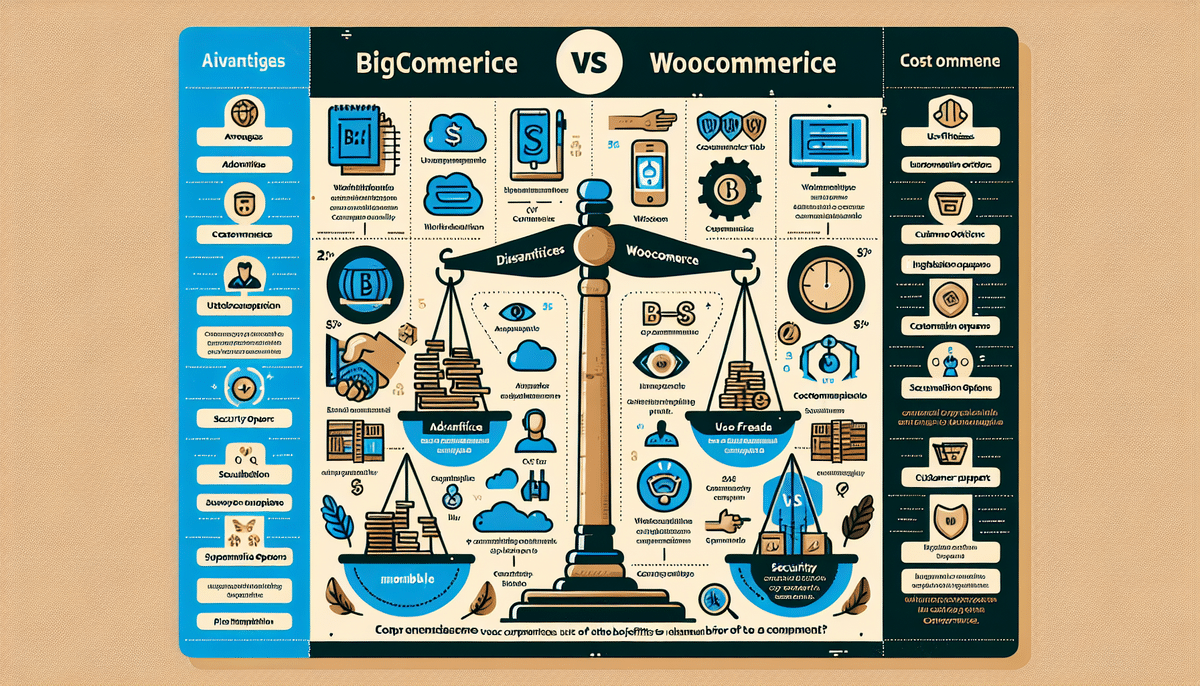WooCommerce vs Shopify: Which eCommerce Platform is Right for You?
In today's digital age, setting up an online store has become essential for business owners. eCommerce platforms provide a cost-effective way to reach customers from all over the world. However, with numerous eCommerce platforms available, choosing the right one can be challenging.
Understanding eCommerce Platforms
An eCommerce platform is an all-in-one software solution that allows businesses to create, manage, and run their online stores. It helps retailers showcase their products, process payments, manage inventory, and fulfill orders. There are two types of eCommerce platforms: self-hosted and hosted. Self-hosted platforms require technical expertise to set up, while hosted platforms are managed by the providers.
One of the key benefits of using an eCommerce platform is the ability to integrate with other software solutions. For example, many platforms offer integrations with popular accounting software like QuickBooks or Xero to streamline financial management. Additionally, some platforms integrate with marketing automation tools such as Mailchimp or HubSpot, helping businesses drive traffic and increase sales. These integrations can save businesses time and money by automating tasks and reducing manual data entry.
WooCommerce vs Shopify: Overview and Comparison
WooCommerce and Shopify are two of the most popular eCommerce platforms available today. WooCommerce is a plugin for WordPress, an open-source content management system, while Shopify is a hosted platform that does not require technical expertise to set up. Each platform has its strengths and weaknesses.
One of the main advantages of WooCommerce is its flexibility and customization options. As a plugin for WordPress, it allows users to fully customize their online store with a wide range of themes and plugins. On the other hand, Shopify offers a more streamlined and user-friendly experience, making it a great option for beginners or those without technical expertise. Additionally, Shopify offers built-in features such as payment processing and shipping options, while WooCommerce requires additional plugins for these functionalities.
Features of WooCommerce
WooCommerce is highly customizable, making it an excellent choice for businesses with unique requirements. It allows users to install and customize themes and plugins, providing a high level of flexibility. Additionally, WooCommerce offers detailed analytics, inventory management, and order fulfillment capabilities. It also supports a wide range of payment gateways and shipping methods.
One of the key features of WooCommerce is its ability to integrate with other platforms and services. This means that businesses can easily connect their online store with their accounting software, email marketing tools, and other third-party services. This integration helps to streamline business operations and improve efficiency. Additionally, WooCommerce is built on WordPress, which is a highly popular and widely used content management system. This means that businesses can take advantage of the vast community of developers and users who are constantly creating new plugins and themes to enhance the functionality of their online store.
Features of Shopify
Shopify is known for its ease of use. It offers an intuitive user interface, making it simple to set up and manage an online store. It provides a wide range of features, including marketing tools, social media integration, and inventory management. Additionally, Shopify offers plenty of templates to choose from, ensuring that businesses can have a professional-looking website without requiring any coding experience.
In addition to its user-friendly interface and extensive feature set, Shopify also offers excellent customer support. The platform provides 24/7 support via phone, email, and live chat, ensuring that businesses can get help whenever they need it. Shopify also has a large community of users and experts who can provide additional support and advice. This level of support can be especially valuable for small businesses or entrepreneurs who may not have a dedicated IT team.
Pricing Comparison: Which Is More Affordable?
WooCommerce is open-source and free to use, but users have to purchase additional tools such as hosting and domain names. Shopify charges monthly fees for its services, with plans starting at $39 per month. While WooCommerce may seem like a more affordable option, businesses must consider other costs such as hosting and payment processing fees. For small businesses just starting, Shopify may offer better overall value.
It's important to note that both WooCommerce and Shopify offer various features and tools that can impact the overall cost. For example, Shopify offers a built-in payment processing system, while WooCommerce requires users to set up their own payment gateway. Additionally, WooCommerce has a steeper learning curve and may require more technical knowledge to set up and maintain. Ultimately, businesses should carefully evaluate their needs and budget before deciding which platform is the most affordable and practical for their specific situation.
Design and Customization: Which Platform Is More Flexible?
WooCommerce offers more customization options than Shopify as it relies on WordPress's extensive plugin and theme ecosystem. Shopify's customization options are limited to its themes and plugins. While both platforms enable businesses to build a professional-looking site without requiring extensive coding experience, WooCommerce provides greater flexibility.
However, it's important to note that Shopify's themes are designed to be highly customizable, and many businesses find that they offer enough flexibility for their needs. Additionally, Shopify's drag-and-drop interface makes it easy to make changes to your site's design without needing to know how to code.
Another factor to consider is that WooCommerce's flexibility can come with a steeper learning curve. While WordPress's plugin ecosystem offers a wide range of customization options, it can be overwhelming for beginners to navigate. Shopify's more streamlined approach may be a better fit for businesses that want to get up and running quickly without needing to spend time learning how to use complex tools.
User Experience: Which Platform Is Easier to Use?
Shopify offers a polished user interface and a guided setup process, making it easy for anyone to set up an online store. WooCommerce, on the other hand, requires some technical expertise and may not be suitable for beginners. Businesses with experience in WordPress may prefer WooCommerce, but those without may find it challenging to use.
However, WooCommerce offers more flexibility and customization options compared to Shopify. With WooCommerce, users have access to a wide range of plugins and themes, allowing them to tailor their online store to their specific needs. Shopify, on the other hand, has a more limited selection of themes and plugins, which may not be suitable for businesses with unique requirements.
Payment Options: Which Platform Offers More Payment Gateways?
Both platforms support a wide range of payment gateways, including major credit cards and PayPal. Additionally, both platforms allow users to add custom payment gateways. However, Shopify offers more built-in payment gateway options and supports over 100 currencies, making it an ideal platform for businesses that operate globally.
It's worth noting that while both platforms offer a variety of payment gateways, the fees associated with each may differ. For example, WooCommerce charges a transaction fee for payments made through third-party gateways, while Shopify does not if you use Shopify Payments. Additionally, Shopify offers its own payment gateway, Shopify Payments, which does not charge any transaction fees. This may be a deciding factor for businesses looking to save on transaction costs.
SEO-Friendliness: Which Platform Is Better for Search Engine Optimization?
Both platforms are SEO-friendly and offer several built-in tools to boost website traffic. WooCommerce, being an open-source platform, offers more customization possibilities in terms of SEO. WordPress's strong SEO capabilities have made WooCommerce a popular choice for businesses seeking to improve their rankings in search engines. Shopify features a comprehensive tool suite to help businesses optimize their store, making it ideal for beginners.
According to recent studies, websites built on WooCommerce and optimized with plugins like Yoast SEO can achieve high search engine rankings. On the other hand, Shopify provides built-in SEO features such as customizable title tags, meta descriptions, and automatic sitemap generation.
However, it's important to note that SEO-friendliness is not solely dependent on the platform used. Other factors such as website content, backlinks, and keyword research also play a crucial role in improving search engine rankings. Therefore, businesses should focus on creating high-quality content and implementing effective SEO strategies in addition to choosing the right platform.
Security and Support: Which Platform Offers Better Security and Customer Support?
Both platforms offer reliable security features to protect users' data and meet PCI compliance standards. Shopify provides 24/7 customer support via phone, email, and live chat. WooCommerce does not offer direct customer support, but with its community of developers and extensive documentation, users have the resources available to solve any of their issues easily.
When it comes to security, Shopify has a slight edge over WooCommerce. Shopify has a dedicated team of security experts who constantly monitor the platform for any potential threats and vulnerabilities. They also provide regular security updates to ensure that the platform is always up-to-date with the latest security protocols. WooCommerce, on the other hand, relies on its community of developers to identify and fix security issues, which can sometimes lead to delays in addressing security concerns.
However, when it comes to customer support, Shopify and WooCommerce have different approaches. Shopify provides direct customer support through phone, email, and live chat, which can be very helpful for users who need immediate assistance. WooCommerce, on the other hand, relies on its community of developers to provide support through forums and online documentation. While this may not be as convenient as direct customer support, it does provide users with a wealth of information and resources to help them solve any issues they may encounter.
Integrations and Add-Ons: What Are the Additional Tools Available on Both Platforms?
Both platforms offer numerous integrations and add-ons that extend their functionalities. Shopify offers a wide range of native integrations with third-party platforms such as Amazon and eBay. On the other hand, WooCommerce has an extensive repository of plugins and themes available, making it a more flexible and customizable platform.
Additionally, Shopify has a built-in point-of-sale system that allows merchants to sell products in person using their mobile devices. This feature is particularly useful for businesses that have both an online and physical presence. WooCommerce, on the other hand, offers a variety of payment gateway options, including PayPal, Stripe, and Square, giving merchants more flexibility in how they accept payments from customers.
Pros and Cons of WooCommerce
Pros:
- Highly customizable
- Open-source and free to use
- Flexible with a wide range of plugins and themes
- Great SEO capabilities
Cons:
- Not suitable for beginners
- Requires technical expertise in WordPress
- Additional costs such as hosting and domain name
Pros and Cons of Shopify
Pros:
- Easy to use with no technical knowledge required
- Great customer support
- Comprehensive tool suite for optimization
- Built-in payment processing and shipping options
Cons:
- Less flexible than WooCommerce
- Might be pricier than WooCommerce for larger businesses
- Limited customization compared to WooCommerce
Conclusion: Choosing the Best eCommerce Platform for Your Business
The choice between WooCommerce and Shopify comes down to your business needs. If you're looking for a highly flexible and customizable platform, WooCommerce may be the better choice. If you're seeking a user-friendly and easy-to-manage platform, Shopify might be more suitable. Additionally, consider your budget and future growth potential, as these factors may influence your decision. Conduct thorough research and select the platform that will help your business succeed in the long run.




















